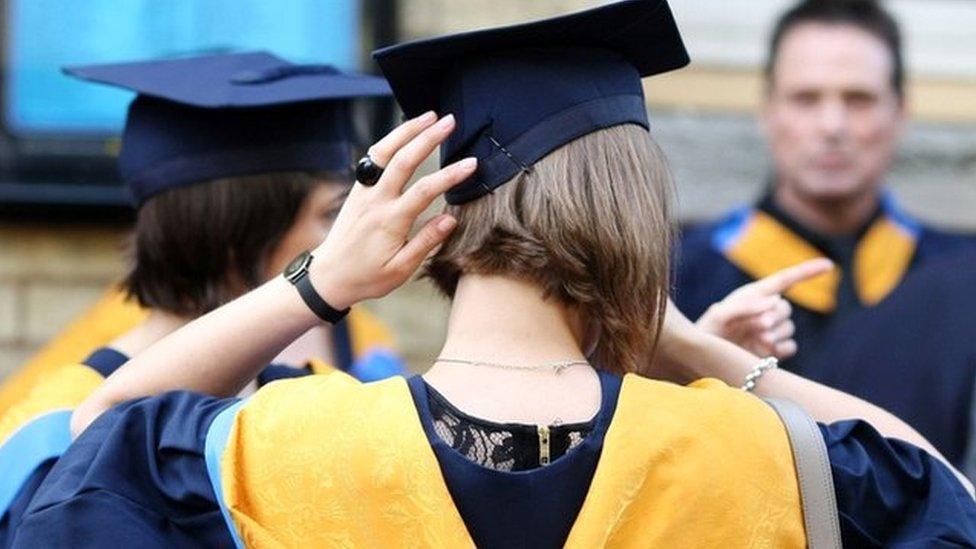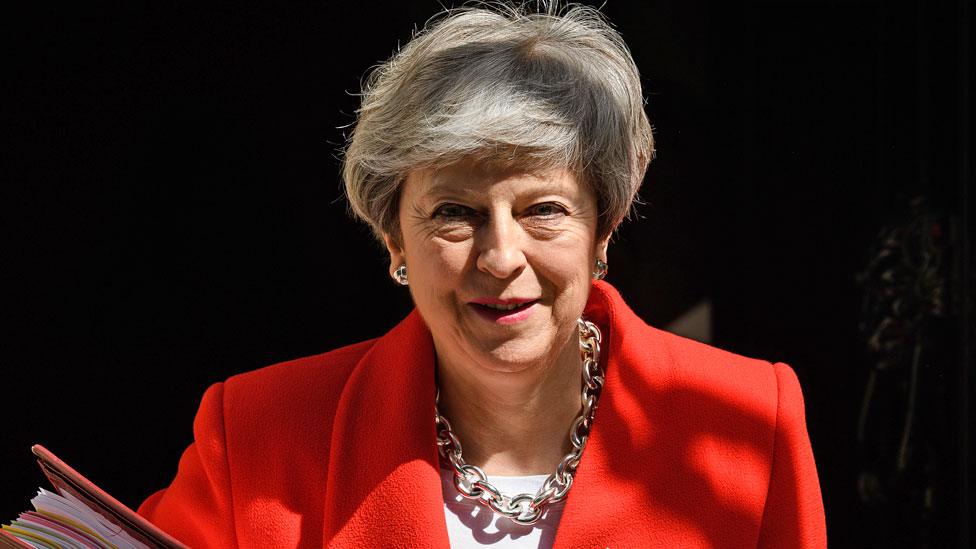Tuition fees cut expected as Theresa May's legacy
- Published

A review recommending a cut in university tuition fees in England is expected to be published in the next couple of weeks.
A lower fee of about £7,500 is expected to be part of Theresa May's "legacy" plans, ahead of her anticipated departure from No 10.
The review, headed by Philip Augar, will argue for better funding for vocational training, including wider access to student finance.
But universities fear a loss of income.
Emptying the in-tray
The review, commissioned by the prime minister, is a significant piece of unfinished political business delayed by the Brexit process.
But the BBC understands that the government wants to announce the review's findings soon after the Bank Holiday weekend at the end of May.
This would be in the brief window between the results of the European elections and a week which will see the visit of Donald Trump, D-Day commemorations and the next vote on the Brexit withdrawal deal.

Theresa May's review ruled out completely scrapping tuition fees last year
However, such timings could still be disrupted - both by the unpredictable political climate, and the need to reconcile the competing interests of No 10, the Treasury and the Department for Education.
Parliament will also not be sitting that week.
Another important aspect of the timing is that the government is not expected to make any full response - with the review's findings being "decoupled" from the decision-making, which will be linked to the spending review scheduled for later this year.
It will be seen by some as making the review more of a series of discussion points, rather than the stepping stone to policy.
Fees down, funding down?
The headline announcement of the review is expected to be a cut in tuition fees - but a wide-ranging set of recommendations will also give more support to vocational and further education.
Universities will be on red alert to see whether the government will promise funding to replace a loss of fee income.

"It should commit to making up the lost university funding in full," says Sarah Steven, director of policy for the Russell Group of leading universities.
"Otherwise this will be a false victory for students who will only see reduced funding for their teaching, equipment and support services."
Other ways of lowering fees could be to remove the amount currently dedicated to widening access - worth more than £800m annually - and replacing it with a centralised budget.
It would reduce the level of tuition fees by more than £1,000 per year from the current maximum of £9,250.
There are likely to be calls for better value for money for students - and questions about financial efficiency, driving down costs and how much courses really cost to deliver.
Grade cut-offs
The Treasury is believed to be concerned about open-ended costs from rising numbers of students - and will be looking for ways to control an expansion of university places.
This has played out in calls for a minimum threshold for entry - such as three D grades at A-level.

But this has been firmly rejected by the universities minister Chris Skidmore.
Other ways of changing the overall cost could be to readjust how many years students have to pay off loans or the threshold for making repayments.
Such debates - about trade-offs between the level of funding and the number of students - are likely to continue beyond the review and into the autumn.
Sir Anthony Seldon, vice-chancellor of the University of Buckingham, says a reduction in fees "will do considerable damage to higher education".
"Further education needs boosting, but not at the expense of higher education."
Sir Anthony wants more investment rather than less, saying that universities "need to be at the very heart of the national regeneration strategy".
More for vocational
As well as tuition fees, the review is expected to look at issues such as student loans for living costs.
There have been calls for a return for means-tested grants and suggestions there will be a higher basic amount for student maintenance.

There will also be consideration of the cost of student accommodation - with the challenge to avoid any extra money for students being swallowed up by rises in campus accommodation charges.
The vocational sector, including further education, is expected to be given more support - providing more balance in a funding system seen to have favoured universities and academic courses.
It is meant to make vocational training a more attractive option and to tackle concerns about skills gaps.
The student finance system is likely to be widened to support more vocational students.
A Department for Education spokesman said the review will "ensure we have a system that is joined up, accessible to all and provides value for money for both students and taxpayers".
"The panel's report is being finalised, and more information will be available in due course," it added.
- Published1 March 2019
- Published23 January 2019
- Published27 November 2018

- Published15 January 2019

- Published2 November 2018
- Published17 December 2018

